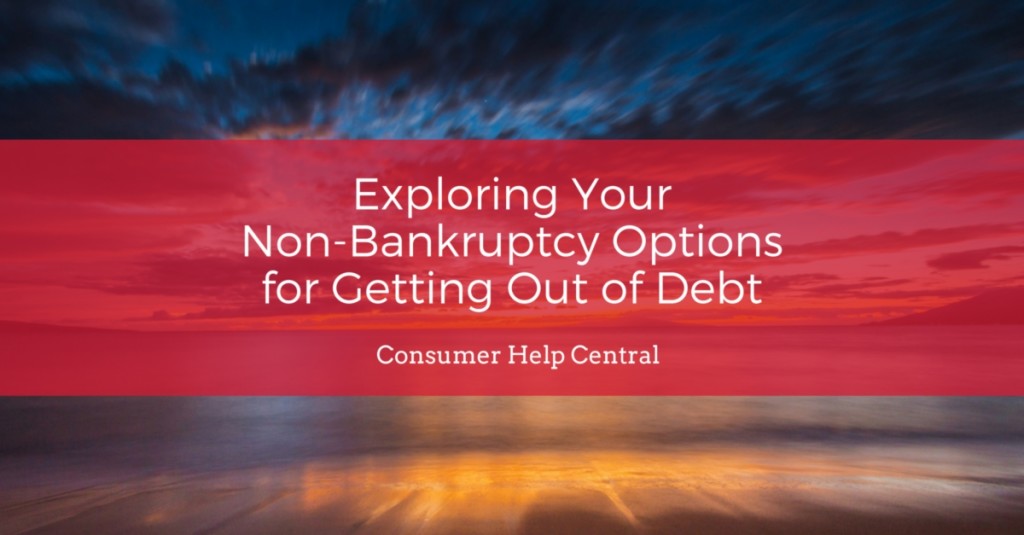No matter how deep your hole of debt, you want to keep bankruptcy as a last resort.
If there’s a way out of debt that doesn’t involve a trip to a bankruptcy lawyer, that’s what you want to do.
After all, bankruptcy costs money and takes time. You have to give up all sorts of financial information, and it doesn’t cover all types of debt.
Most important, bankruptcy is a tool you can’t use all the time. Better to save your best option for last.
Most of my job as a bankruptcy lawyer is to help my clients understand that I’m the last stop on the train, not the first. Consultations usually involve laying out all the options and then looking at which one is the best.
If filing for bankruptcy is the right way to go, I can usually help. But here are some of the other choices you should look at first.
Debt Consolidation
Debt consolidation involves taking out a new loan to pay off the other ones. If you qualify for new financing at a better rate than the existing debts, it may make sense.
Unfortunately, most of the people who meet with me are already past due on their debts and so don’t qualify for a new loan. Still, it’s worth it for you to try as a way to get out of debt.
I’m not talking about taking out a pension loan to pay off your old debts. That’s nothing more than borrowing from your future to pay for your past, and it’s a bad idea. Leave the pension money where it is.
You should also think twice before taking out a second mortgage as a consolidation loan. If you’re unable to pay the second mortgage then the lender can take your home.
Debt Management Plans
There are companies that will take all your debts, negotiate new payments with the lenders, and pay them on your behalf. You make one monthly payment, and the debt management company divides the funds among the creditors.
If you’re working with a debt management company it’s important to put all your bills into the plan. Keeping even one credit card out of the plan means that you’ll be responsible for making payments to two companies. Keeping a card outside the plan also means there’s a chance that you end up over your head in debt to that creditor as well.
One problem with debt management companies is that they usually deal with credit card debt only. If you’ve got tax debts, student loans or other bills then you may not be able to handle all your debts using one of these companies.
Debt Settlement
You can usually settle your credit card debt once you’ve been in default for awhile. Depending on how far behind you are, you may be able to get a huge discount off the balance due.
Debt buyers snap up past due accounts for pennies on the dollar. They’re often more willing to give you a break on the balance due so long as they make a profit off their investment.
Debt settlement isn’t for everyone, though. If you owe money to more than one company then there’s a chance you can’t settle all your debts. That may leave you with more debt and no solution for repayment.
There are also possible tax consequences when you settle a debt. You may have to pay income taxes on the part of the debt that’s forgiven, so talk with your tax professional before you settle any account.
Walk Away From Your Debts
You may decide to ignore your debts and hope they go away. This may be a good idea if you aren’t working, don’t have any assets, or just can’t pay the debts.
Your creditors have only a limited amount of time to file a lawsuit against you to collect the debt. Some creditors may decide it’s not worth it to sue you, and others may wait too long.
For those creditors that decide to sue you, you can defend the lawsuit or settle the debt at that time.
Your credit score will suffer if you don’t pay your debts, but if you don’t need to buy anything on credit then it may not matter to you. The bad accounts will fall off sooner or later, and you can start to rebuild when that happens.
If you owe money for taxes or federal student loans then this strategy won’t work for you. There’s no statute of limitations for federal debts, so the government can collect forever.
In the end, how you choose to get out of debt comes down to simple arithmetic. Look at your income, your assets, and your debts. Review your options and see which one works for you.
Once you’ve had the chance to look at your choices, you may decide that bankruptcy makes sense for you. Take the time to make an informed decision so you can be confident that you choose the right path.
